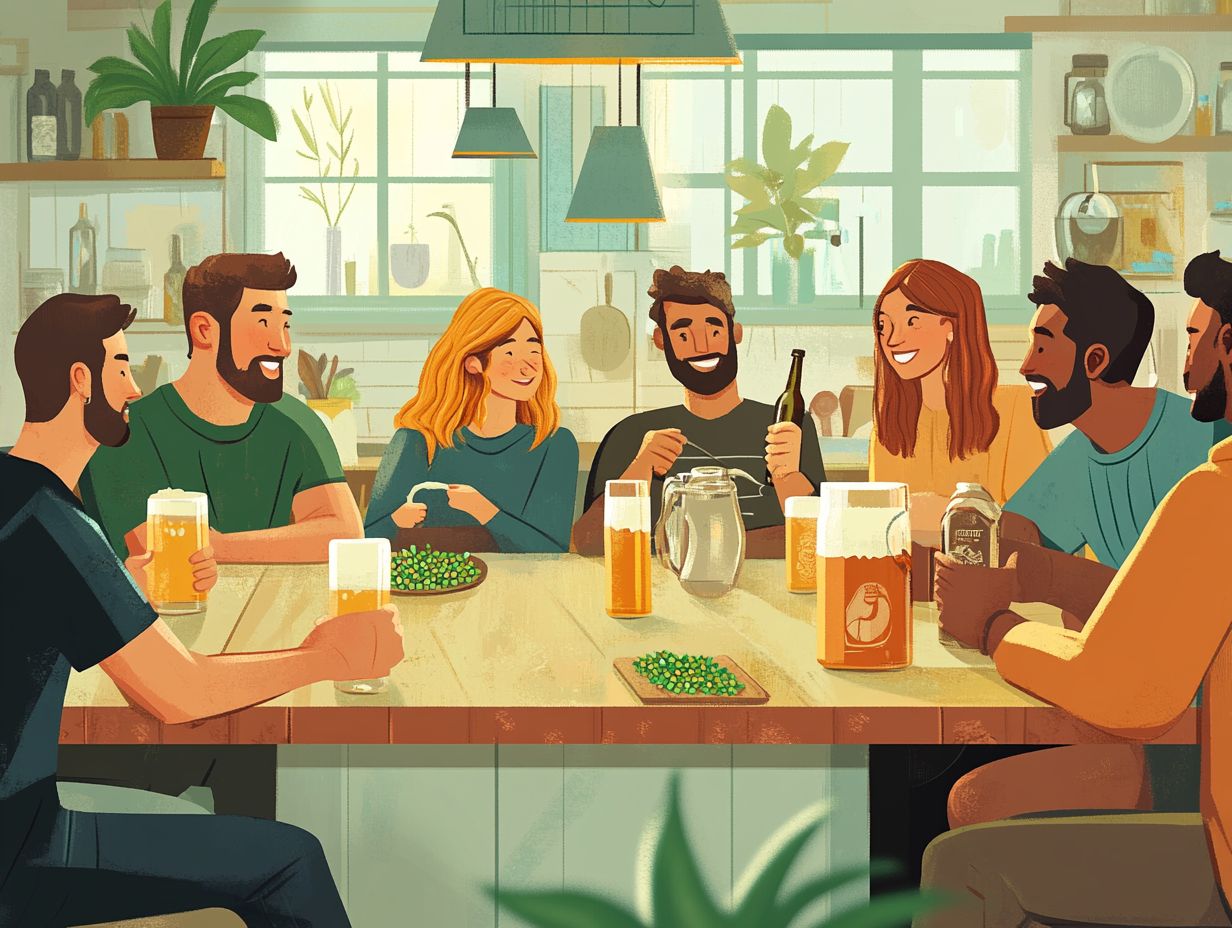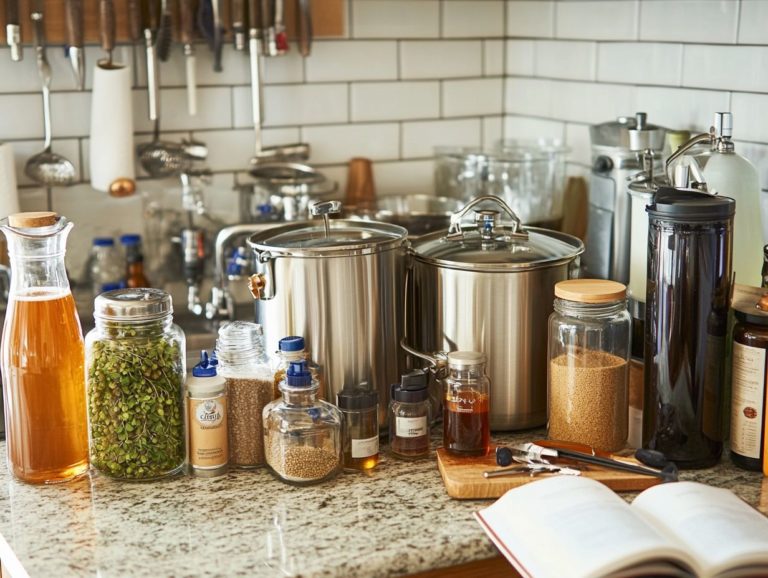5 Tips for Collaborating with Other Home Brewers
Collaborating with fellow home brewers presents an exhilarating opportunity to refine your brewing skills and unleash your creativity, especially when engaging in brewing collaborations with local breweries. Get ready to take your brewing experience and community relationships to amazing new heights!
Regardless of whether you’re a novice or a seasoned pro, there’s always a wealth of knowledge waiting to be uncovered through the experiences of others in the craft beer community. Here are five essential collaboration tips to ensure successful collaboration, focusing on effective communication and resource sharing.
You’ll discover the advantages and challenges of working together, learn how to find the perfect brewing partners, explore innovative recipes, and engage in collaborative marketing strategies.
Contents
- Key Takeaways:
- 1. Communicate Effectively
- 2. Set Clear Goals and Expectations
- 3. Share Equipment and Resources
- 4. Be Open to Trying New Techniques and Recipes
- 5. Document and Track Your Collaborations
- What Are the Benefits of Collaborating with Other Home Brewers?
- Frequently Asked Questions
- What are some common challenges when collaborating with other home brewers?
- What are the benefits of collaborating with other home brewers?
- How can I find other home brewers to collaborate with?
Key Takeaways:

- Communicate effectively to ensure everyone is on the same page, avoid misunderstandings, and enhance community engagement.
- Set clear goals and expectations to stay focused, maximize productivity, and address potential brewing challenges.
- Share equipment and resources to save money, try new brewing techniques, and improve your brewing process.
1. Communicate Effectively
Effective communication is the bedrock of successful collaboration in the brewing community, particularly for local brewers like yourself who are eager to innovate and craft unique collaboration brews that truly resonate with beer enthusiasts. In Portland, a city abundant with craft breweries, your ability to share thoughts, ideas, and feedback becomes essential for enriching the brewing experience and ensuring that all partners are in sync with one another.
Hold regular meetings to discuss progress and challenges. This helps build teamwork among your collaborators. These gatherings serve as a platform for brainstorming and problem-solving, allowing you to explore the intricacies of brewing techniques in depth.
Leveraging shared digital platforms further enhances this process, providing a continuous, accessible space for updates and document sharing. This facilitates the clear statement of brewing goals and keeps everyone on the same page. By establishing open feedback loops, you create an environment where constructive criticism is encouraged, giving power to you and your fellow brewers to adapt and refine your processes.
With clarity and consistency in communication, your brewing team can effectively navigate the inevitable challenges that arise, ensuring that every collaboration becomes a rewarding endeavor that delights both brewers and beer lovers alike.
2. Set Clear Goals and Expectations
Setting clear goals and expectations is essential for your success in the craft beer industry. It lays the groundwork for a focused brewing process and ensures that everyone involved is on the same page regarding their desired outcomes. Whether you re crafting innovative recipes or experimenting with unique ingredients, having well-defined objectives streamlines your efforts and elevates the brewing experience, especially in collaborative brewing projects.
By establishing specific, measurable goals with timelines and clearly defined responsibilities, you can significantly enhance the collaborative effort. When you align expectations from the very beginning, you reduce misunderstandings that often slow progress, particularly in the collaborative brewing process.
Take, for instance, a remarkable collaboration between two craft breweries aiming to produce a limited-edition sour ale. They outlined precise roles for each participant, covering everything from recipe formulation to marketing strategies. This structured approach fueled their creativity and led to a successful launch, illustrating the remarkable power of focused teamwork within the brewing community.
Collaboration is key in brewing. Here s how to share effectively. Sharing equipment and resources is at the heart of brewing partnerships, and it can truly elevate the brewing dynamics among local breweries and homebrew clubs. By pooling your brewing equipment and resources, you can tackle common brewing challenges, explore innovative recipes, and create collaboration brews that you might not be able to achieve on your own.
There are various types of brewing equipment that you can share effectively. Think of essential fermentation tanks, which enable multiple brewers to experiment with diverse yeast strains, bottling lines that streamline your packaging process, and quality control tools that ensure each batch meets the highest standards.
Collaboration goes beyond just sharing physical equipment; it s also about establishing a framework for communication and scheduling that maximizes usage while minimizing conflicts.
By working together, you can share the costs and upkeep of these invaluable resources. This collaboration cultivates a stronger sense of community, helping to build lasting relationships and enhance the overall quality of your brews.
4. Be Open to Trying New Techniques and Recipes

Being open to trying new techniques and recipes is crucial for fostering innovation within the craft beer industry, especially when you engage in collaborative brewing projects with other brewers. Embracing unique ingredients and experimental brewing methods can lead to the creation of standout collaboration brews that not only delight beer enthusiasts but also push the boundaries of traditional brewing.
Innovation enhances the experience for both you and fellow consumers while contributing to a lively brewing community. By sharing your experiences and results at beer tasting events, you can gather valuable feedback that serves as a catalyst for future projects.
For example, when two breweries come together to create an exciting coffee-infused stout, their combined expertise can yield a brew that wins awards and spark discussions that inspire other brewers to explore unconventional flavor pairings.
The excitement generated by these collaborations highlights how pushing creative boundaries can lead to success and camaraderie within the craft community.
5. Document and Track Your Collaborations
Documenting and tracking your collaborations is essential for elevating your brewing experience and promoting continuous improvement among all brewers involved in joint projects. This practice empowers you to maintain detailed records of your brewing processes, innovative recipes, and unique techniques, ultimately enriching your brewing education and enabling knowledge-based decision making for future collaborations.
By leveraging tools like brewing journals or specialized brewing software, you can effectively catalog your successes and challenges. This approach not only sharpens your processes but also nurtures a culture of learning and growth within the brewing community.
Participating in collaborative brewing events can further enhance these connections, allowing you to share insights and discoveries while celebrating collective achievements.
These gatherings not only strengthen community bonds but also create a supportive network where both triumphs and setbacks are recognized as integral parts of mastering your craft.
What Are the Benefits of Collaborating with Other Home Brewers?
Collaborating with other homebrewers brings a wealth of benefits that can elevate both your brewing journey and the overall brewing community. From exchanging innovative recipes to enjoying the camaraderie that stems from a shared passion for craft beer, you stand to gain immensely.
By engaging with homebrew clubs and participating in collective brewing projects, you can tap into diverse skill sets and gain valuable insights. Ultimately, you can craft unique collaboration brews that push the boundaries of flavor and technique.
One of the most significant advantages of collaboration is the boost in creativity. When different brewing styles come together, exciting new styles and flavor profiles emerge.
Take, for example, a renowned homebrew club in Oregon that recently partnered with a local coffee roaster. They combined their expertise to create a rich coffee stout that exceeded all expectations. This collaboration not only highlighted the brewers’ ingenuity but also fostered community ties through their shared commitment to local ingredients and the craft.
Working alongside fellow brewers allows you to explore various brewing techniques and hop varieties. This exposure enriches your practices and expands your brewing repertoire. Ultimately, this benefits the entire brewing scene and enhances your personal brewing experience.
What Are the Potential Challenges of Collaborating with Other Home Brewers?
While brewing collaborations can lead to thrilling outcomes that you won’t want to miss, they also come with challenges that you should be ready to tackle. Issues such as differing brewing styles and resource limitations can arise, making it crucial to address these hurdles proactively.
You might encounter conflicts in brewing style when each participant has a unique vision for the final product. Scheduling difficulties can further complicate matters when different priorities come into play.
Establishing clear communication protocols from the outset is essential. This ensures that everyone is aligned on goals and expectations. Fostering a mutual understanding of each brewer’s role not only enhances teamwork but also cultivates camaraderie.
This shared commitment to the brewing collaboration can significantly reduce potential friction. It leads to a more harmonious brewing experience, ultimately resulting in a product that beautifully showcases the talents of local brewers.
How Can You Find Other Home Brewers to Collaborate With?

Finding other home brewers to collaborate with can be a truly rewarding endeavor. This enriches your experience in the brewing community and cultivates valuable relationships among local breweries and homebrew clubs.
By diving into brewing events, joining online forums, and networking within craft beer circles, you can connect with like-minded brewers who share your passion for collaboration.
Attending beer festivals is an especially effective way to meet fellow craft beer enthusiasts. These vibrant events are filled with passionate individuals eager to share their knowledge and experiences.
Joining local brewing clubs offers a more intimate atmosphere where personal connections can flourish over shared brewing sessions and discussions about brewing techniques.
Leveraging social media platforms tailored to the craft beer community can open broader networking opportunities. This enables you to showcase your work and find collaborators who resonate with your vision.
Building these relationships enhances your brewing process and nurtures a sense of community that champions local craft initiatives. Don t wait start connecting with fellow brewers today and elevate your brewing experience!
What Are Some Fun Ideas for Collaborative Brewing Projects?
Engaging in collaborative brewing projects presents an exciting opportunity for you to unleash your creativity. Explore innovative recipes that reflect your unique brewing style.
Consider hosting themed brewing events, experimenting with unusual hop varieties, or crafting limited-edition brews that celebrate local businesses and strengthen community ties. Such projects can also highlight the innovative spirit of craft breweries and the diverse beer styles they bring to the craft beer industry.
By harnessing the strengths and expertise of each partner, you can elevate your craft to new heights. Picture a seasonal beer that marries your flair for fruity flavors. Partner with another brewer’s mastery of traditional techniques to create a refreshingly distinct beverage that stands apart in the market.
Through such brewing innovation, you can create brews that captivate beer enthusiasts and stand out in the craft beer industry. Engaging in friendly competitions between breweries can ignite rivalries and encourage you to step beyond your comfort zone.
Hosting beer tasting events provides a platform to showcase these collaborative creations. Allow enthusiasts to appreciate the unique characteristics that emerge from each partnership and the brewing challenges overcome in the process.
These initiatives spark community engagement and fuel excitement among brewers. They enrich the overall brewery culture, inviting creativity and camaraderie among everyone involved.
How Can You Ensure a Successful and Enjoyable Collaboration?
Ensuring a successful and enjoyable collaboration hinges on several key practices that enhance your brewing experience. Strengthen partnerships among collaborators by establishing clear communication channels and fostering an atmosphere of respect and creativity.
Engaging in shared decision-making is vital; it ensures that everyone’s ideas and brewing techniques are valued and woven into the process. Regular check-ins provide opportunities to reassess goals and progress, helping maintain alignment throughout your brewing journey.
Community engagement plays a crucial role in cultivating long-lasting partnerships. It allows you to connect with local audiences and build a sense of trust.
Ultimately, these collaborative efforts can lead to the creation of unique brews that highlight the individual artistry of each brewer. They will also stand out in the vibrant craft beer market. Effective collaborative marketing, or working together to promote your unique beers, can further enhance the visibility and appeal of these creations.
Frequently Asked Questions
What are some tips for collaborating with other home brewers?

1. Clearly define roles and responsibilities: Make sure everyone knows their tasks to avoid confusion or duplication of efforts.
2. Communicate effectively: Establish regular communication channels to ensure smooth collaboration.
3. Establish a timeline: Set a timeline for each step of the brewing process to keep everyone on track.
4. Share resources and knowledge: Collaborate with other home brewers to learn and share resources.
5. Be open to new ideas: Don’t hesitate to try new techniques or recipes suggested by your collaborators.
How can I ensure a successful collaboration with other home brewers?
1. Establish a common goal: Ensure everyone is on the same page and working towards the same end goal.
2. Respect each other’s opinions: Collaboration involves compromise; respecting each other’s ideas is crucial for a successful partnership.
3. Be organized: Keep track of tasks, recipes, and brewing equipment to avoid confusion.
4. Be flexible: Plans may change, so be open to adjusting your collaboration as needed.
5. Celebrate your success: After all the hard work, celebrate and enjoy the fruits of your collaboration.
If you have tips or experiences to share about collaborating with other home brewers, we’d love to hear from you in the comments!
What are some common challenges when collaborating with other home brewers?
1. Scheduling conflicts: With different schedules and commitments, finding a time that works for everyone can be a challenge.
2. Creative differences: Everyone has their own brewing style and taste preferences, which may clash during a collaboration.
3. Lack of communication: Poor communication can lead to misunderstandings and delays in the brewing process.
4. Different levels of effort: Sometimes, one person works harder than others, which can create tension.
5. Recipe disagreements: Choosing a recipe that everyone agrees on can be tricky, especially if there are strong preferences or restrictions.
What are the benefits of collaborating with other home brewers?
1. Exciting Learning Opportunities! When you collaborate with others, you discover fresh techniques, recipes, and insights into brewing.
2. You can also split costs: Sharing resources and equipment helps reduce the cost of brewing, allowing you to experiment with new ingredients or equipment.
3. Expanding your brewing network: Collaborating with other home brewers introduces you to new people, potential mentors, and future collaboration opportunities.
4. Unique brews: By combining different brewing styles and knowledge, you can create unique and exciting brews that you may not have been able to make on your own.
5. Camaraderie: Working together towards a common goal strengthens friendships and fosters a sense of community within the home brewing scene.
How can I find other home brewers to collaborate with?
1. Join online communities: Social media groups and forums dedicated to home brewing are great places to connect with other brewers.
2. Attend local events: Home brewing festivals, competitions, and workshops are excellent opportunities to meet fellow brewers in your area.
3. Don’t hesitate to ask your friends! They might know eager brewers ready to collaborate.
4. Reach out to local home brewing clubs: Many cities have clubs where members share knowledge and resources, and collaborate on brews.
5. Utilize home brewing supply stores: These stores often have bulletin boards or host events to help you connect with other home brewers nearby.
Dive into the world of home brewing collaboration today and elevate your brewing game!






